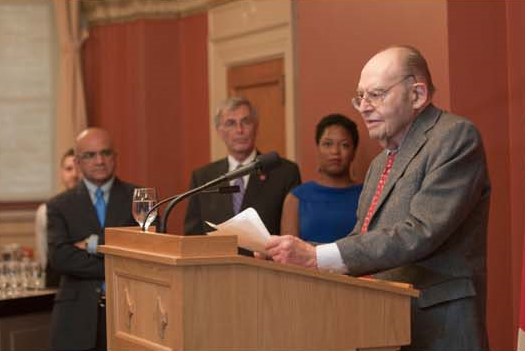April 25, 2014
Herb Gray: a leading nationalist and progressive Liberal
By Andrew Cardozo

Herb Gray’s first and legendary impact on Canadian politics was in 1972 when as Minister of Consumer and Corporate Affairs he pressed for greater control of foreign investment in Canadian industry. The Gray Report of that year, officially called “Foreign Direct Investment in Canada” reflected the growing concerns of Canadians about the increase in foreign investment. That year he introduced the “Act to Provide for the Review and Assessment of Acquisitions of Control of Canadian Business Enterprises by Certain Persons”, which would lead to the establishment of the Foreign Investment Review Agency. (That of course was in the days when Acts had ridiculously long names that reflected what they did, rather than campaign styles names, like the “Fair Elections Act”, a name necessitated by the fact that almost no observers detect any evidence of fairness…..but I digress. Point being: look how things have changed!)
Here is what Gray said when he introduced Bill C-201, all of 42 years ago on May 4, 1972 “takeovers are the form of investment least likely to add significant benefits to the Canadian economy. The extent of foreign control of a number of industries in Canada is large enough to make the acquisitions of more Canadian businesses a matter of concern to the government and to Canadians generally”.
Pierre Trudeau dropped Gray from cabinet in 1976, some say to make way for other new faces in a mid-term cabinet shake-up, but others observe that his nationalist and left-ward leanings were falling out of favour with the Prime Minster as his government was tilting a bit to the right at that time.
Friends were impressed by how Gray never uttered a word of bitterness and went about his job as an ordinary MP with the same enthusiasm. Being a Member of Parliament, after all, was the highest calling for Gray. The rest was secondary for a man known for his humility till the end of his time in public life.
Then of course came 1979, when the Trudeau government was defeated by Progressive Conservative Joe Clark and the Liberals again lurched left-word and Gray returned to the front bench as the party’s Finance Critic. It was like Walter Gordon was brought back to life. He had much influence in the campaign platform for the 1980 election which saw a strengthening of FIRA. By the end of the 1980-84 mandate however, with a roaring recession, the Liberals retreated from the FIRA stand and turned it into Investment Canada, more of welcoming mat than a review agency.
As we Canadians keep spinning around on this issue, we see the Conservative government of Stephen Harper introducing new limits on foreign investment following the CNOOC controversy and the hostile takeover bid of Potash Corp by the Anglo-Australian company BHP Billiton. Plus ça change!
He focused on various other progressive measures during his years in other portfolios: affirmative action for women in the federal public service when he was Treasury Board President in the Trudeau government and employment equity in the RCMP when he was Solicitor General at the start of the Chrétien government.
As President of the Treasury Board, Gray got to oversee the cutbacks during the recession of the early 1980s but was able to guard progressive programs that were core to Liberal philosophy.
In cabinet he was one of the leading members on the left, countering the more right-leaning members – a feature that made Liberal cabinets so successful as they included the big tent at the centre of the political spectrum. He was a leader on issues such as climate change and compensation to residential school survivors. As a Jew he had an innate sense of standing up for minorities and was always conscious of being a trail blazer for minorities himself, being the first Jewish cabinet minister. And in the last Trudeau administration he as one of three Jews in cabinet along with Bob Kaplan and Jack Austin.
In his personal life it was always fun to watch his wife, Sharon Sholzberg-Gray, who was head of the Canadian Health Coalition and was often publicly critical of Liberal cuts to health care and provincial transfers. She was always proud that he had no problem with that. He was after all a true egalitarian and accepted that they each had important careers that would inevitably bring their public utterances into conflict. One can imagine separate studies in their home, with an elaborate Chinese wall in between!
Part of his success in Windsor, election after election, was his every-man lifestyle. He was not into the trappings of power or fortune. His friends were ordinary folks and not the well heeled.
When it comes to his last controversy – whether Prime Minister Stephen Harper should have offered a state funeral or not – my guess is if the offer had been made to the family, it may have been declined for a more modest every-man funeral. It’s just too bad that it was not offered, because it was so well deserved. This modest man served the Canadian public with distinction at the highest levels.
Andrew Cardozo is a regular columnist at the Hill Times and is president of the Canadian Centre for Progressive Policy.



